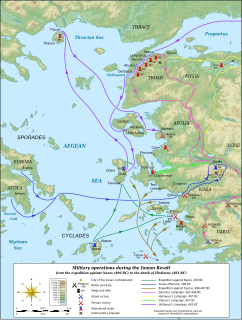
The Peloponnesian War was an ancient Greek war fought by the Delian League led by Athens against the Peloponnesian League led by Sparta. Historians have traditionally divided the war into three phases. In the first phase, the Archidamian War, Sparta launched repeated invasions of Attica, while Athens took advantage of its naval supremacy to raid the coast of the Peloponnese and attempt to suppress signs of unrest in its empire. This period of the war was concluded in 421 BC, with the signing of the Peace of Nicias. That treaty, however, was soon undermined by renewed fighting in the Peloponnese. In 415 BC, Athens dispatched a massive expeditionary force to attack Syracuse, Sicily; the attack failed disastrously, with the destruction of the entire force in 413 BC. This ushered in the final phase of the war, generally referred to either as the Decelean War, or the Ionian War. In this phase, Sparta, now receiving support from the Achaemenid Empire, supported rebellions in Athens's subject states in the Aegean Sea and Ionia, undermining Athens's empire, and, eventually, depriving the city of naval supremacy. The destruction of Athens's fleet in the Battle of Aegospotami effectively ended the war, and Athens surrendered in the following year. Corinth and Thebes demanded that Athens should be destroyed and all its citizens should be enslaved, but Sparta refused.

Milazzo is a town (comune) in the Metropolitan City of Messina, Sicily, southern Italy; it is the largest commune in the Metropolitan City after Messina and Barcellona Pozzo di Gotto. The town has a population of around 31,500 inhabitants.

Ionia was an ancient region on the central part of the western coast of Anatolia in present-day Turkey, the region nearest İzmir, which was historically Smyrna. It consisted of the northernmost territories of the Ionian League of Greek settlements. Never a unified state, it was named after the Ionian tribe who, in the Archaic Period, settled mainly the shores and islands of the Aegean Sea. Ionian states were identified by tradition and by their use of Eastern Greek.
This article concerns the period 349 BC – 340 BC.
This decade witnessed the continuing decline of the Achaemenid Empire, fierce warfare amongst the Greek city-states during the Peloponnesian War, the ongoing Warring States period in Zhou dynasty China, and the closing years of the Olmec civilization in modern-day Mexico.
This article concerns the period 359 BC – 350 BC.
This article concerns the period 279 BC – 270 BC.
Year 36 BC was either a common year starting on Tuesday, Wednesday or Thursday or a leap year starting on Wednesday of the Julian calendar and a common year starting on Wednesday of the Proleptic Julian calendar. At the time, it was known as the Year of the Consulship of Publicola and Nerva. The denomination 36 BC for this year has been used since the early medieval period, when the Anno Domini calendar era became the prevalent method in Europe for naming years.

Artabazos was a Persian general in the army of Xerxes I, and later satrap of Hellespontine Phrygia under the Achaemenid dynasty, founder of the Pharnacid dynasty of satraps. He was the son of Pharnaces, who was the younger brother of Hystaspes, father of Darius I. Artabazos was therefore a first cousin of the great Achaemenid ruler Darius I.
Heraclea, Heracleia, Herakleia, or Heraclia may refer to:

The Ionian Revolt, and associated revolts in Aeolis, Doris, Cyprus and Caria, were military rebellions by several Greek regions of Asia Minor against Persian rule, lasting from 499 BC to 493 BC. At the heart of the rebellion was the dissatisfaction of the Greek cities of Asia Minor with the tyrants appointed by Persia to rule them, along with the individual actions of two Milesian tyrants, Histiaeus and Aristagoras. The cities of Ionia had been conquered by Persia around 540 BC, and thereafter were ruled by native tyrants, nominated by the Persian satrap in Sardis. In 499 BC, the tyrant of Miletus, Aristagoras, launched a joint expedition with the Persian satrap Artaphernes to conquer Naxos, in an attempt to bolster his position. The mission was a debacle, and sensing his imminent removal as tyrant, Aristagoras chose to incite the whole of Ionia into rebellion against the Persian king Darius the Great.
Sextus Pompeius Magnus Pius, in English Sextus Pompey, was a Roman general from the late Republic. He was the last focus of opposition to the Second Triumvirate. His father was Gnaeus Pompeius Magnus.

For war between the navy of Rhodes and the navy of Macedon in 201 BC, see Battle of Lade.

Obzor is a small town and seaside resort on the Black Sea coast of Bulgaria. It is part of Nesebar municipality, Burgas Province.
Panormos or Panormus, meaning "sheltered harbor", may refer to:
Portus Julius was the first harbour specifically constructed to be a base for the Roman western naval fleet, the classis Misenensis. The port was located at Misenum on a peninsula at the northern end of the Gulf of Naples. Portus Julius was named in honour of Octavian's great-uncle and adoptive father, Julius Caesar and the Julian clan.
The Pact of Misenum was a treaty to end the naval blockade of the Italian Peninsula during the Sicilian revolt. The pact was signed in 39 BC between Sextus Pompeius and the members of the Second Triumvirate. The triumvirs allowed Sextus Pompeius to retain his control of Sicily and Sardinia and also granted him control of Corsica and the Peloponnesus.






